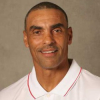Herman Edwards

Herman Edwards
Herman "Herm" Edwards, Jr.is an American football analyst who most recently coached in the National Football League for the Kansas City Chiefs. Since 2009, he has been a pro football analyst for ESPN. He played cornerback for 10 seasonswith the Philadelphia Eagles, Los Angeles Rams and Atlanta Falcons. Prior to his coaching career, Edwards was known best as the player who recovered a fumble by Giants quarterback Joe Pisarcik on a play dubbed "The Miracle at the Meadowlands."...
ProfessionCoach
Date of Birth27 April 1954
CityFort Monmouth, NJ
And when guys don't play as well as they anticipate, they generally come back the next week and play better.
We want celebrations, but we don't want it where you cross the line. These guys are creative, and they'll come up with some stuff. But I don't like it where you embarrass the other team.
I've been in the league since the 1970s, or for parts of the past four decades. There's always going to be those guys that want a little extra or need a little extra and are trying to cut corners. They generally feel that they need to enhance their play. It's a never-ending battle. But that's just part of our society.
The way we're looking at it is some young guys will get an opportunity to play, ... They'll learn from this.
No one called me up from the booth saying we should challenge it. That's what those guys are supposed to do. I didn't get a phone call.
It's a performance-based business, and it's hard for a player to all of a sudden think that something he's buying over the counter could be banned and affect his ability to play and get the job done, ... It's up to the individual player to either say, 'You know what? I'm not doing it,' or 'I'm going to take a chance. If they test me, I won't be one of the guys that it shows up on.'
It was important that Mike got a chance to kick some field goals, I was praying he'd make that first one (from 48) because you guys would've been all over him.
Almost every one of these guys is going to end up playing in the NFL. You have to see them.
A lot of people look at the last preseason game as if it's not important. Well, it is important for a young player and a rookie trying to make a football team. Most teams have to cut down 18 or 15 players and bring eight of them back. So, I think it will be a very competitive game for the most part and I look forward to seeing these young guys play.
We have to have a different mind-set - that was established today in our meetings, ... I think our players took hold of it and did a good job of practicing. It was a pretty fast practice, guys moving around where they were supposed to go.
I always used to say this when we won, it's not easy going to the playoffs, ... I think now these guys are realizing that they've been on a little bit of a carpet ride. You kind of take that for granted.
You look at the league and 25% of your team will not come back. Guys will retire, there are salary-cap restrictions and guys just don't meet the team's needs. That's a fact; your team will change.
When I got the job here in New York, there were a couple guys who were supposed to be the favorites. You don't worry about that. If you get your day in court, you go in there and talk to them.
I think what's going to help him, he's in with the first group, ... That's always settling for a quarterback, rather than playing with some guys that were probably some good high school, college players, and won't make your team. He had to do that for three years, survived it. Now he's going in with our first group.